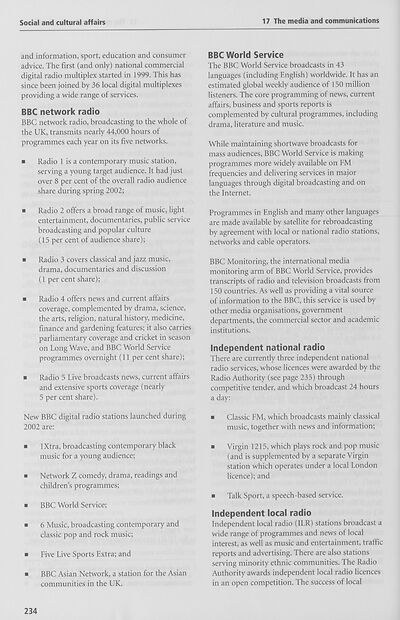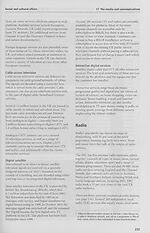Download files
Complete book:
Individual page:
Thumbnail gallery: Grid view | List view

Social and cultural affairs
17 The media and communications
and information, sport, education and consumer
advice. The first (and only) national commercial
digital radio multiplex started in 1999. This has
since been joined by 36 local digital multiplexes
providing a wide range of services.
BBC network radio
BBC network radio, broadcasting to the whole of
the UK, transmits nearly 44,000 hours of
programmes each year on its five networks.
■ Radio 1 is a contemporary music station,
serving a young target audience. It had just
over 8 per cent of the overall radio audience
share during spring 2002;
■ Radio 2 offers a broad range of music, light
entertainment, documentaries, public service
broadcasting and popular culture
(15 per cent of audience share);
■ Radio 3 covers classical and jazz music,
drama, documentaries and discussion
(1 per cent share);
■ Radio 4 offers news and current affairs
coverage, complemented by drama, science,
the arts, religion, natural history, medicine,
finance and gardening features; it also carries
parliamentary coverage and cricket in season
on Long Wave, and BBC World Service
programmes overnight (11 per cent share);
■ Radio 5 Live broadcasts news, current affairs
and extensive sports coverage (nearly
5 per cent share).
New BBC digital radio stations launched during
2002 are:
■ IXtra, broadcasting contemporary black
music for a young audience;
■ Network Z comedy, drama, readings and
children’s programmes;
■ BBC World Service;
■ 6 Music, broadcasting contemporary and
classic pop and rock music;
■ Five Live Sports Extra; and
■ BBC Asian Network, a station for the Asian
communities in the UK.
BBC World Service
The BBC World Service broadcasts in 43
languages (including English) worldwide. It has an
estimated global weekly audience of 150 million
listeners. The core programming of news, current
affairs, business and sports reports is
complemented by cultural programmes, including
drama, literature and music.
While maintaining shortwave broadcasts for
mass audiences, BBC World Service is making
programmes more widely available on EM
frequencies and delivering services in major
languages through digital broadcasting and on
the Internet.
Programmes in English and many other languages
are made available by satellite for rebroadcasting
by agreement with local or national radio stations,
networks and cable operators.
BBC Monitoring, the international media
monitoring arm of BBC World Service, provides
transcripts of radio and television broadcasts from
150 countries. As well as providing a vital source
of information to the BBC, this service is used by
other media organisations, government
departments, the commercial sector and academic
institutions.
Independent national radio
There are currently three independent national
radio services, whose licences were awarded by the
Radio Authority (see page 235) through
competitive tender, and which broadcast 24 hours
a day:
■ Classic EM, which broadcasts mainly classical
music, together with news and information;
■ Virgin 1215, which plays rock and pop music
(and is supplemented by a separate Virgin
station which operates under a local London
licence); and
■ Talk Sport, a speech-based service.
Independent local radio
Independent local radio (ILR) stations broadcast a
wide range of programmes and news of local
interest, as well as music and entertainment, traffic
reports and advertising. There are also stations
serving minority ethnic communities. The Radio
Authority awards independent local radio licences
in an open competition. The success of local
234
17 The media and communications
and information, sport, education and consumer
advice. The first (and only) national commercial
digital radio multiplex started in 1999. This has
since been joined by 36 local digital multiplexes
providing a wide range of services.
BBC network radio
BBC network radio, broadcasting to the whole of
the UK, transmits nearly 44,000 hours of
programmes each year on its five networks.
■ Radio 1 is a contemporary music station,
serving a young target audience. It had just
over 8 per cent of the overall radio audience
share during spring 2002;
■ Radio 2 offers a broad range of music, light
entertainment, documentaries, public service
broadcasting and popular culture
(15 per cent of audience share);
■ Radio 3 covers classical and jazz music,
drama, documentaries and discussion
(1 per cent share);
■ Radio 4 offers news and current affairs
coverage, complemented by drama, science,
the arts, religion, natural history, medicine,
finance and gardening features; it also carries
parliamentary coverage and cricket in season
on Long Wave, and BBC World Service
programmes overnight (11 per cent share);
■ Radio 5 Live broadcasts news, current affairs
and extensive sports coverage (nearly
5 per cent share).
New BBC digital radio stations launched during
2002 are:
■ IXtra, broadcasting contemporary black
music for a young audience;
■ Network Z comedy, drama, readings and
children’s programmes;
■ BBC World Service;
■ 6 Music, broadcasting contemporary and
classic pop and rock music;
■ Five Live Sports Extra; and
■ BBC Asian Network, a station for the Asian
communities in the UK.
BBC World Service
The BBC World Service broadcasts in 43
languages (including English) worldwide. It has an
estimated global weekly audience of 150 million
listeners. The core programming of news, current
affairs, business and sports reports is
complemented by cultural programmes, including
drama, literature and music.
While maintaining shortwave broadcasts for
mass audiences, BBC World Service is making
programmes more widely available on EM
frequencies and delivering services in major
languages through digital broadcasting and on
the Internet.
Programmes in English and many other languages
are made available by satellite for rebroadcasting
by agreement with local or national radio stations,
networks and cable operators.
BBC Monitoring, the international media
monitoring arm of BBC World Service, provides
transcripts of radio and television broadcasts from
150 countries. As well as providing a vital source
of information to the BBC, this service is used by
other media organisations, government
departments, the commercial sector and academic
institutions.
Independent national radio
There are currently three independent national
radio services, whose licences were awarded by the
Radio Authority (see page 235) through
competitive tender, and which broadcast 24 hours
a day:
■ Classic EM, which broadcasts mainly classical
music, together with news and information;
■ Virgin 1215, which plays rock and pop music
(and is supplemented by a separate Virgin
station which operates under a local London
licence); and
■ Talk Sport, a speech-based service.
Independent local radio
Independent local radio (ILR) stations broadcast a
wide range of programmes and news of local
interest, as well as music and entertainment, traffic
reports and advertising. There are also stations
serving minority ethnic communities. The Radio
Authority awards independent local radio licences
in an open competition. The success of local
234
Set display mode to:
![]() Universal Viewer |
Universal Viewer | ![]() Mirador |
Large image | Transcription
Mirador |
Large image | Transcription
The item on this page appears courtesy of Office for National Statistics and may be re-used under the Open Government Licence for Public Sector Information.
| Britain and UK handbooks > UK: The official yearbook of the United Kingdom of Great Britain and Northern Ireland > 2003 > (256) |
|---|
| Permanent URL | https://digital.nls.uk/204926438 |
|---|
| Attribution and copyright: |
|
|---|---|
| Description | Three volumes of 'UK: The official yearbook of the United Kingdom of Great Britain and Northern Ireland', published annually by the Office of National Statistics from 2002-2005. |
|---|---|
| Shelfmark | GII.11 SER |
| Description | Three titles produced by the British Government from 1954-2005 describing 'how Britain worked'. They are: 'Britain: An official handbook' (1954-1998), 'Britain: The official yearbook of the United Kingdom' (1999-2001), and 'UK: The official yearbook of the United Kingdom of Great Britain and Northern Ireland' (2002-2005). These 50 reports provide an overview of Britain's economic, social and cultural affairs, its environment, international relations, and the systems of government. They give an impartial summary of government policies and initiatives, and explain how public services are organised. |
|---|---|
| Additional NLS resources: |
|

